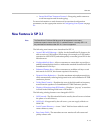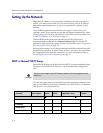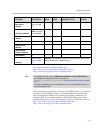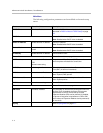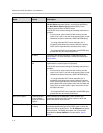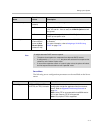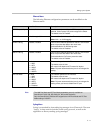
Administrator’s Guide SoundPoint IP / SoundStation IP
3 - 4
Supported Provisioning Protocols
The bootROM performs the provisioning functions of downloading
configuration files, uploading and downloading the configuration override
file and user directory, and downloading the dictionary and uploading log
files.
The protocol that will be used to transfer files from the boot server depends on
several factors including the phone model and whether the bootROM or SIP
application stage of provisioning is in progress. By default, the phones are
shipped with FTP enabled as the provisioning protocol. If an unsupported
protocol is specified, this may result in a defined behavior (see the table below
for details of which protocol the phone will use). The Specified Protocol listed
in the table can be selected in the Server Type field or the Server Address can
include a transfer protocol, for example http://usr:pwd@server (refer to
Server Menu on page 3-9). The boot server address can be an IP address,
domain string name, or URL. The boot server address can also be obtained
through DHCP. Configuration file names in the <Ethernet address>.cfg file
can include a transfer protocol, for example
https://usr:pwd@server/dir/file.cfg. If a user name and password are
specified as part of the server address or file name, they will be used only if the
server supports them.
Note
A URL should contain forward slashes instead of back slashes and should not
contain spaces. Escape characters are not supported. If a user name and
password are not specified, the Server User and Server Password will be used
(refer to Server Menu on page 3-9).
Specified
Protocol
Protocol used by
bootROM
Protocol used by
SIP Application
301, 320, 330, 430,
501, 550, 560, 600,
601, 650, 670, 4000,
6000, 7000
301, 320, 330, 430,
501, 550, 560, 600,
601, 650, 670, 4000,
6000, 7000
FTP FTP FTP
TFTP TFTP TFTP
HTTP HTTP HTTP
HTTPS HTTP HTTPS
Note
There are two types of FTP methods—active and passive. As of SIP 1.5 (and
bootROM 3.0), the SIP application is no longer compatible with active FTP. At that
time, secure provisioning was implemented.






